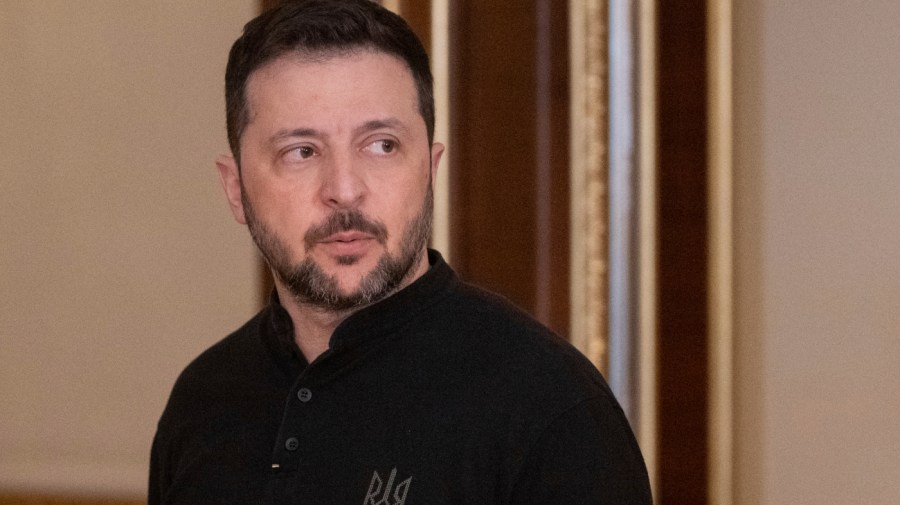In Ukraine and the world of the world, sovereignty is under siege

President Trump’s speech on Canada as “State 51” is treated by many as a political theater – a trick by the president to destabilize the opposition, perhaps. But his remarks indicate something less harmful and more worrying.
Now, we all have heard somewhat loud speech to the new president of America. “Trump suggests that Canada has become the state 51 after Trudeau said the tariff would kill the economy,” says the main headlines from Fox News. Politico states that “Trump threatens to restore the Panama Channel.” “Trump is again calling for Greenland to buy after looking at Canada and Panama,” says Associated Press.
It is recognized that the bold notes of Trump are not new and are not taken seriously in most circles – only more political correspondence by a pious president with many of his companions.
However, Trump’s bold talk about these states does something much deeper than just the speech. Although his warnings may not be determined, this is beside this point.
President Trump raises the global policy boiler. Comments about the customs tariff, in addition to the inclusion and regions of sovereignty, and its restoration of a caustic response in addition to its own share of the humor of the media.
In addition to its recreational value, Trump’s provocations (even if he is not aware of this), indicates a hidden and possibly more dangerous issue: Could the rule of the nation -state be the principle that we had believed in since the seventeenth century?
Although the concept of the sovereign nation -state has its origin in 1648 in peace, Westphalia and the end of the thirty -year -old religion in the thirty years, the “lack of border” is a relatively modern phenomenon.
The idea of ”the truth in the state” appeared in the late nineteenth and early twentieth century, which was embraced by two counter -entities: the Bolsheviks of Russia, the liberal American president, Woodro Wilson. Both sought to dismantle the empires – Russia for ideological reasons and the United States to expand their influence.
The result was the proliferation of relatively weak countries and the Almighty that (for all practical purposes) has become tools for Moscow and Washington’s foreign policy. The sovereignty of these “new countries”-which mainly depends on foreign support (military, economically and politically) because of its existence-was more than just a bargaining segment.
This dynamic continued until the Second World War in the Neolibral era today. In fact, almost every conflict until the mid -twentieth century ended with the limits of its redrawing.
So, this is the question: Do we do the same thing today in Ukraine?
Certainly, there were previous examples of the sacrifice of sovereignty for peace: Sodeenland Czechoslovakia in 1938, Serbia/Kosovo in 1999 and others.
In a world where power increases on military power, sovereignty has turned from the principle of international law to an issue of practical control. The control comes from the outside of the alleged sovereign state – often in favor of the agendas of foreign authority.
The sovereignty of Ukraine is stabbed for reasons that have nothing to do with the country itself.
Consider the transformation of events in Ukraine. Since a “special military operation” in Moscow, (i.e. the invasion), this country has not been able to maintain control of about five (20 percent) of its sovereign lands.
Moreover, its prospects for restoring them decrease daily. After a telephone call between Trump and Putin, the operation began towards a ceasefire and a re -drawing the borders of Ukraine.
At the same time, with the exception of the United States and a few Eastern European countries such as Hungary, Slovakia, Britain and the European Union – in response to the Trump Peace Initiative – continues to support Ukraine militarily and financially with billions of dollars. While it seems that the response of the United Kingdom and the European Union support the Battle of Ukraine against Moscow, these countries have hidden motives.
Britain has historically watched Moscow through a “terrorist lens”, believing that it pose a threat to its interests – especially the jewel of the crown – India. Today, Britain is “medium power”, and it does not adapt well to the loss of the empire.
In fact, Europeans need Russia as a department depicted for two reasons: First, Europe needs an “enemy” in order to justify the spending of $ 840 billion on security for fear of giving up Trump. Second, Russia is needed as an imagined threat to assemble the “Balkans” European Union.
With Trump’s deals for energy and natural resources and the reintegration of Russia into a group 7-of which is Britain and the European Union for fighting?
Ukraine is used in an agent war for reasons that have nothing to do with what is in the interest of the country. Ukraine borders are being redrawn and its sovereign lands are redefined by the country’s external forces.
In this changing global scene, it appears that the region and external control it has become essential in international politics. Given this reality, the idea of sovereignty-and the system based on the US-led rules that maintain it-should not become a victim of defective political initiatives.
Trump’s comments about the inclusion of Canada, the restoration of Panama and the purchase of Greenland (from a country that has no legal right to sell) highlights accurate hypocrisy in the international community. It seems that sovereignty, which was once treated as Qudsantant, is increasingly granted a political agenda for various eastern and West foreign policies.
The concept of “sovereign state entities that possesses the monopoly of power within its recognized lands is” the concept of “the sovereign entities of the state that possesses the monopoly of power within its recognized lands. It confirms that no country should interfere in the internal affairs of another country. It supports the idea that every state has the right to rule itself without external interference.
The entire Ukraine disaster contradicts this principle. The 2014 coup to remove President Victor Yanukovic, who argues some was affected by West, Russian invasion, and sabotaging the 2022 peace talks and hundreds of thousands who were killed, and spoke to the critical lack of consideration of the concept of sovereignty within the international community.
Could globalization and troubled European Union are symptoms of a basic disease – an attack on sovereignty?
Today, Ukraine is considered only a name, as the United Kingdom, the United States, the European Union and Russia ultimately decide through regional concessions and political control how its sovereignty will appear.
In the twenty -first century, the people of Eastern Europe should not take their sovereignty – and the freedom that it rules – is not free of it. Just ask the people of Ukraine today and yesterday’s people.
F. Andrew Wolf Junior is the director of the Victorom Institute, and is an organization for current and former scientists in the humanities, arts and science.




Post Comment